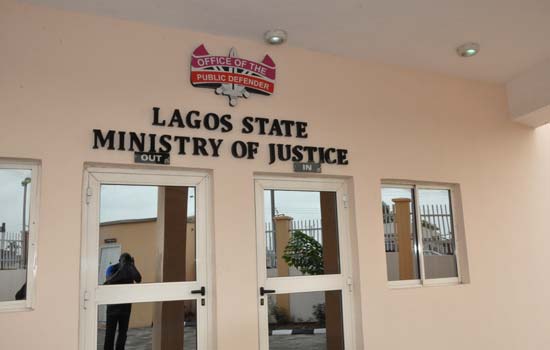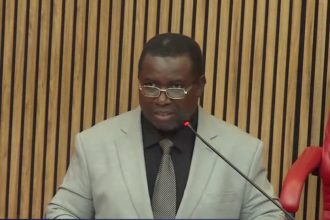The Lagos State Ministry of Justice has announced the expansion of its District Prosecutor Scheme to more magisterial districts across the state.
This is in a bid to curb police abuse and prevent the wrongful prosecution of civil matters as criminal cases.
Since its inception, the scheme has expanded beyond the initial pilot districts of Ogba, Ebute-Metta, and Ikorodu to cover more areas, including Apapa, Eti-Osa, Yaba, Ajah, Epe, and Lagos Island.
Speaking at a stakeholders’ meeting in Ikeja, the Senior Special Adviser to the Attorney General, Mr Adebayo Haroun, revealed that the initiative, launched in April 2020, has significantly improved the state’s justice system by vetting police-prepared charges before they reach the courts.
According to Haroun, the scheme had helped reduce frivolous charges, protect citizens’ rights, and ease court congestion.
He noted that the Ogba Magistrates’ Court continued to record the highest number of criminal cases in the state, with over 1,100 cases received in the first half of 2025 alone.
Haroun, speaking during the second stakeholders’ meeting on plea bargain and district prosecutor’s scheme, organised by the Lagos State Ministry of Justice, said between January and June 2025, the Ogba district received 1,121, of which 1,049 were approved and 72 declined.
The trend, he said, continued from previous years.
“In 2024 alone, Ogba received 2,441 cases, approving 2,383 and declining 58.
“Similarly, between October and December 2023, Ogba district topped the chart again, reinforcing its position as the busiest magisterial district in Lagos.
“Ogba consistently receives more case files than any other district. This shows the high volume of criminal justice activity in that area,” Haroun said.
The scheme deploys state counsel district prosecutors to magisterial districts to vet police-prepared charges before they are filed.
Haroun explained that the initiative was necessary because some police officers “turn civil matters into criminal cases,” leading to wrongful detentions and court congestion.
“The state does not have power over the police, so we can’t really give directives. But what can we do in the interim to make sure the police do not see us as enemies? That’s why we created the district prosecutor scheme,” Haroun said.
He credited the advisory committee, led by Mr Fola Arthur-Worrey, with developing the scheme to address the abuse of police powers and streamline case management.
Haroun further stated the scheme had a notable impact between January and December 2024.
“Of the 6,732 cases brought forward, 6,412 were approved, while 350, about 5 per cent, were declined,” he said.
The trend shifted slightly in 2025, as 9 per cent of cases were declined in the first half of the year, signalling increased scrutiny.
“This shows the scheme is becoming more effective in screening out weak or civil-based cases that shouldn’t be in criminal court,” he noted.
Ebute-Metta district demonstrated 100 per cent approval in both 2024 and the first half of 2025, while Apapa and Yaba districts recorded higher numbers of declined cases in the same period.
Epe and Ajah also showed strong compliance with the vetting standards.
“The scheme aims to prevent wrongful detention, ensure proper vetting of cases, and reduce the burden on our courts,” Haroun explained.
“We’ve seen a significant reduction in court congestion and a more just judicial process,” Haroun added.
Despite the success, challenges remain, particularly with some police formations that attempt to bypass the district prosecutors.
“There are still police divisions shopping around where we don’t have prosecutors to file questionable cases.
“We recommend institutionalising a Standard Operating Procedure across all police formations in Lagos to enforce compliance,” Haroun said.
He urged continued collaboration between the police and prosecutors to protect the rights of residents and ensure only deserving cases reach the courts.
“This scheme reflects the Lagos State government’s commitment to uphold the rule of law and protect human rights.
“Together, we can build a fairer and more efficient justice system,” he stated.
In his earlier remarks, the Solicitor-General and Permanent Secretary of the Lagos State Ministry of Justice, Mr Hammed Oyenuga, who also represented the Attorney General, Lawal Pedro (SAN), called for stronger stakeholder collaboration to improve the plea bargain framework and the District Prosecutors Scheme.
He described both as critical tools for achieving a more efficient, fair, and responsive criminal justice system.
Oyenuga expressed appreciation to participants for their continued commitment to the state’s ongoing reforms in the administration of justice.
“Today’s meeting marks a significant step in our collective journey towards reforms that are not only necessary but urgent.
“The plea bargain mechanism, when properly understood and utilised, serves as a powerful tool in reducing the burden on our courts, improving case turnaround time, and securing swift justice,” Oyenuga said.
“The District Prosecutor Scheme, a key innovation of the Lagos State Ministry of Justice, is designed to prevent abuse of prosecutorial powers and ensure that only properly vetted charges reach our courts,” he added.
In his welcome address, the Director of Public Prosecutions, Dr Babajide Martins, emphasised the need to evaluate the state’s performance on plea bargaining by listening directly to stakeholders.
Martins said, “Basically, why we are here is to take stock of what we are doing with the plea bargain.
“We need feedback. One of the ways to ensure productivity and efficiency is to hear from the service users—those who interact with the system. How are we doing? How can we improve?”
He stressed that performance could not be accurately measured without stakeholder input.
“I wouldn’t know if I’m doing well or not unless I get feedback. That’s why this conversation is so important,” he said.
Martins also expressed appreciation to the commissioner, as well as the solicitor general and other stakeholders whose collaboration had advanced the state’s justice reforms.
The meeting brought together key actors from the judiciary, Justice Samuel Candide-Johnson (retd.), magistrates, DPP from Osun State, police, Nigeria Correctional Service, and the legal community to assess the operational efficiency of the plea bargain framework and the impact of the district prosecutors scheme on pre-trial detention and court congestion.









